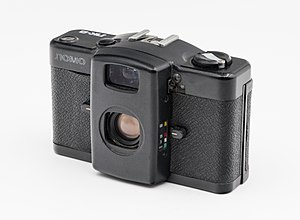|
Lomo LC-A
The LOMO LC-A (Lomo Kompakt Automat) is a fixed lens, 35 mm film, leaf shutter, zone focus, and compact camera introduced in 1984. Its design is based on the Cosina CX-2, with the difference being that it lacks a swiveling front and self-timer.[1] It was built in Soviet-era Leningrad by Leningrad Optics and Mechanics Association (LOMO).[2] Production of the camera ceased in 1994.[3] In the mid-1990s, a group of enthusiasts from Vienna persuaded LOMO to restart production,[2] which continued until 2005, and they formed the Lomographic Society International, distributing these cameras around the world. The LOMO LC-A's replacement, the LC-A+, was introduced in 2006 and production moved to China.[4] The LC-A+ featured the original LC-A Minitar-1 glass lens manufactured by LOMO in Russia.[5] This changed in 2007 and lenses on subsequent models have been made in China.[3] Some LC-As were sold badged as Zenith,[6] this label was only a sticker underneath the lens. Zenit (Zenith in some countries) is a trademark of KMZ (Krasnogorsk Mechanical Works). Austrian company Lomography now offers three versions of the LC-A, the LC-A+ and LC-Wide in 35 mm format and the LC-A 120 in medium format.[7] OperationThe only automatic function offered by the LC-A is exposure. Film loading, winding, rewinding, and focus adjustments are accomplished manually. The aperture can also be set manually, the shutter speed is fixed at 1⁄60 s (this ability was removed from the LC-A+).[3] Exposure is completely automatic when the camera is set to "A"; the shutter speeds range from 2 minutes to 1⁄500 s. The aperture range is f/2.8 to f/16. The automatic exposure system compensates for changes in light levels after the shutter is opened by increasing or decreasing the shutter speed. This, in conjunction with the rear-curtain flash-sync, results in interesting effects with flash photography in low ambient light levels.[3] The lens is focused by selecting one of four zones (0.8 m, 1.5 m, 3 m or ∞). Older versions of the camera feature viewfinder icons showing the currently selected focus zone, a feature omitted from later models. A battery checking feature uses a LED inside the viewfinder; if there is sufficient power this illuminates whenever the shutter release button is lightly depressed. Another viewfinder LED illuminates whenever the camera's chosen shutter speed is below 1⁄30 s.  Body designThe size and shape is very close to that of the Cosina CX-2, the main difference being that the lens bezel is fixed (unlike the rotating one of the CX-2). Power is supplied by three 1.5v silver oxide cells (S76, LR44). See also
References
External linksWikimedia Commons has media related to Lomography. Wikimedia Commons has media related to LOMO LC-A. |
||||||||||||||||||||||||||||||||||||||||||||||||||||||

